Ketterman
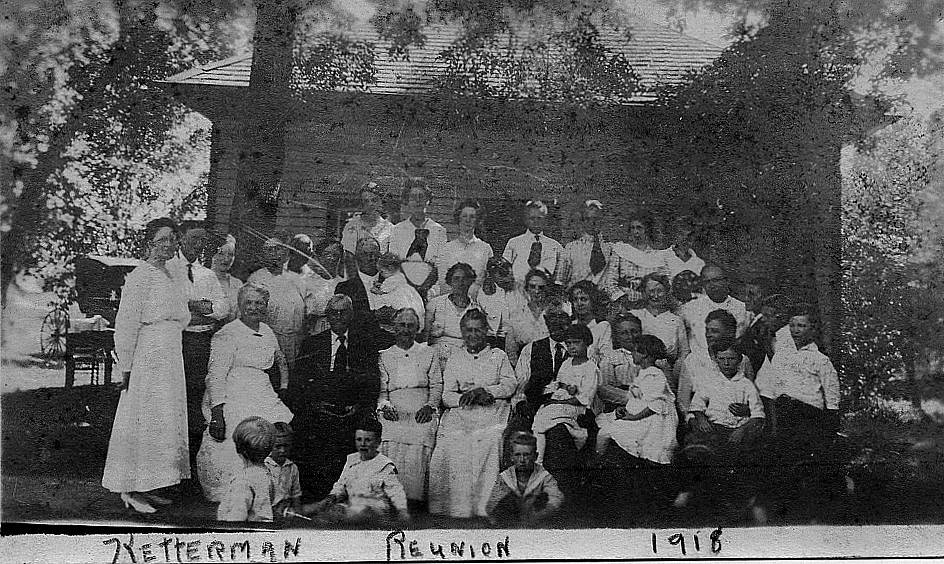
James S. Ketterman family reunion at Urbana, Iowa 1918. Ed Ketterman second from left. James with suit coat and Lucy next to him on right.
What are the chances of two men immigrating from the same country at about the same time with the same name? That is exactly what happened in the Ketterman/Kitterman/Ketteman family. Christopff Kettenmann born 1729 in Grobgartach, Wurttemberg Germany was the first with this name to immigrate to America. He settled in Frederick county, Maryland. His descendants used the name Kitterman and Ketteman.
The Kitterman stone house below circa 1750 is one of three original structures on the property built by Christopher Kitterman located at Rocky Hill, Frederick, Maryland. The home is in the National Registry of homes as it boasts one of the finest examples of German stone masonry in the United States.
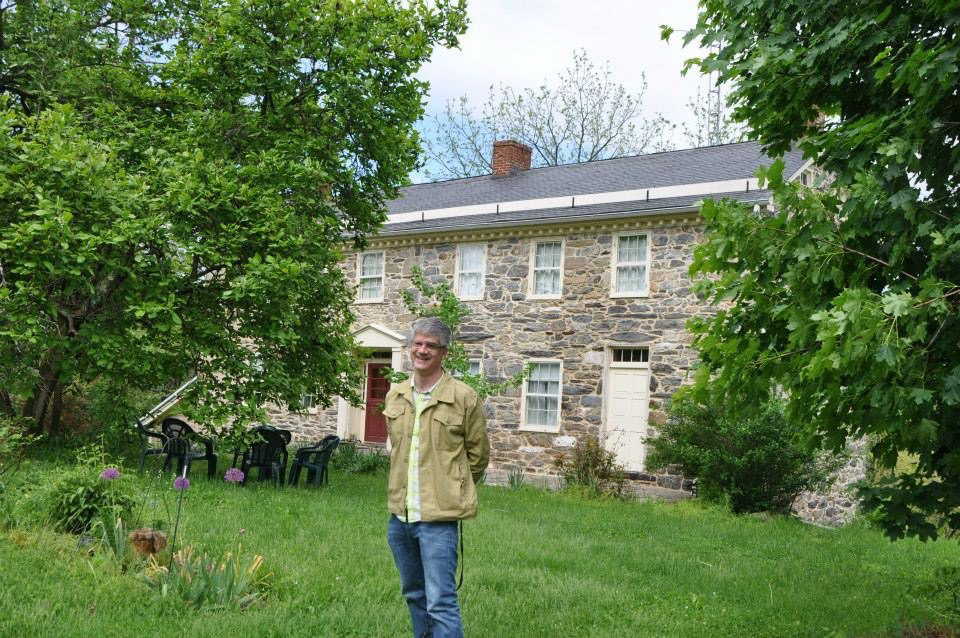
Next was a man with the same name but born in 1735. He went first to Pennsylvania but then migrated south into what was Virginia but now is West Virginia. His descendants use the surname Ketterman . Our family is descended from Christopff's and Anna Margaret Lawall's son George F. Ketterman
George F. Ketterman was born February 16, 1767. He married Mary Magdalena Henckel in 1793 in Riverton, Pendleton county, West Virginia. They had a large family and their son Justice W. was born 1795 and fought in the War of 1812 under his uncle Captain Jesse Henckel in the Virginia Militia.
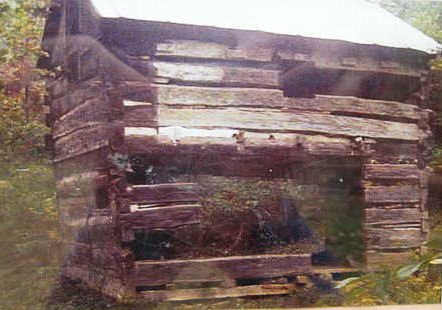
This Ketterman smokehouse is located in Pendleton County, Virginia. This is on the farm Where George F. Ketterman and Mary Henckle raised their family. The town of Ketterman is located at the end of Smoke Hole Road, in the Big Bend National Recreation Area Campground. The Smokehouse chimney and foundation, and a house foundation still exists near where once was the town of Ketterman. (N 38* 53.385', W 79* 14.280) Photo courtesy of Danny Hingley.
All that is left of the Post Office and the town of Ketterman in Smoke Hole Canyon in West Virginia.
Justus married Mary Ann Wood December 23, 1819 in Greenfield Ross county, Ohio,
By 1838 the family had moved to Muncie, Delaware county, Indiana where they had a son James Sparr Ketterman. In 1845 Justus was elected Constable for Delaware county. In 1852 the family moved to Benton County, Iowa. Juatus died January 16, 1867 at Urbana, Benton county, Iowa. Mary Ann lived 20 years longer and migrated west with her granddaughter to Kansas.
James married Lucy Jane Storts whose parents came to Iowa from Perry county, Ohio on September 23, 1860. Lucy's father was John Harter Storts.
Paul Ketterman's grandfather James migrated to Iowa in 1852 with his father Justus W. Ketterman They settled in the town of Maryville but later the name was changed to Urbana. They had a farm one mile outside of town.
James and Lucy had the following children Alice, Elizabeth, Arminda, Charles, Emma, Miriam Belle, Viola, Effie, Edwin, Lillian Blanche. Polk School #2 was on part of the original "Ketterman Place" as it had been known as. The family cemetary was also on the farm but had been moved some time later to the present Urbana cemetery.
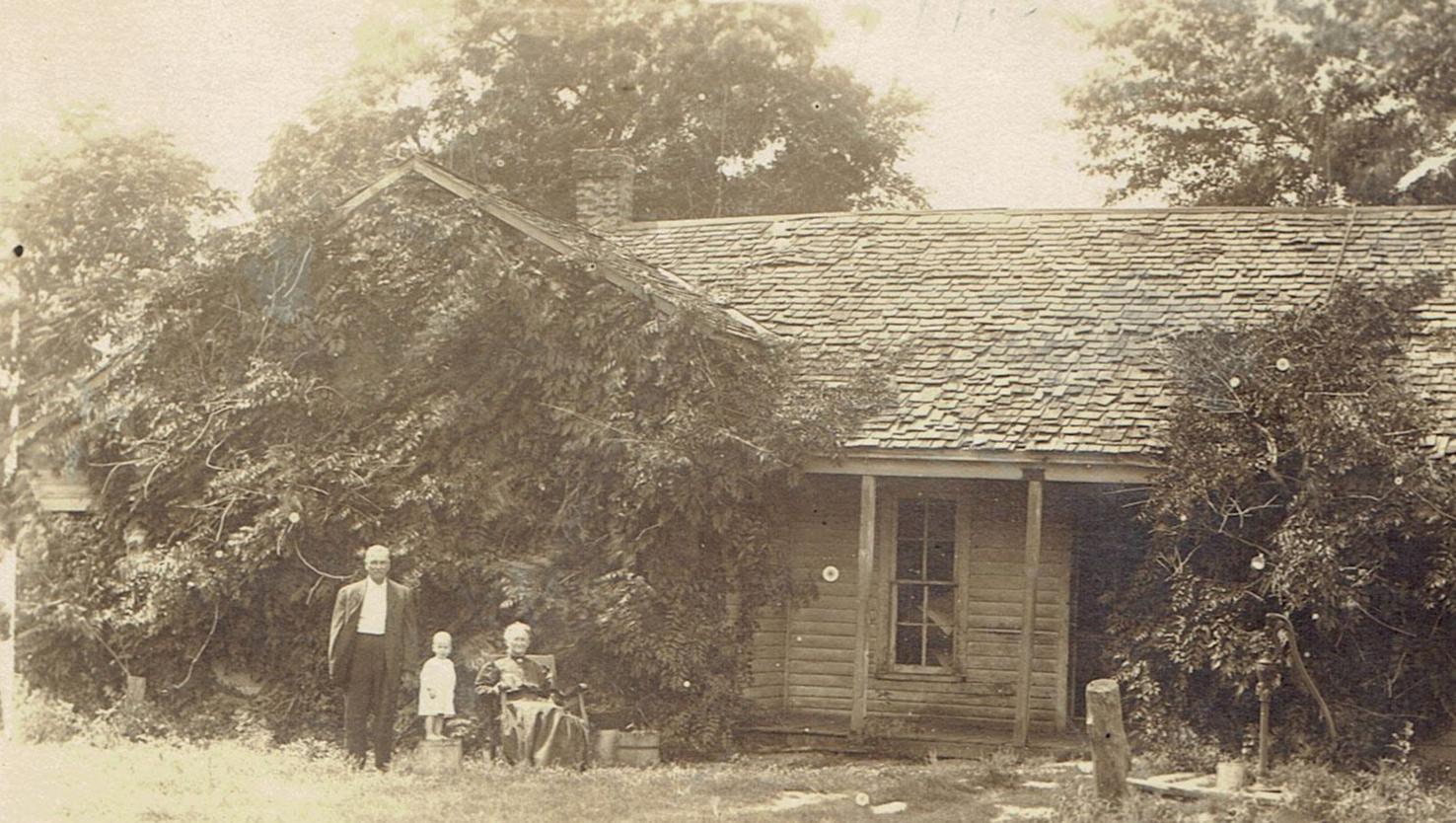
Picture is of James and Lucy with grandson in front of old Ketterman farm house.
Edith Luella Pratt came to Urbana to visit her sister and that is how she met Edwin L Ketterman Back in Kansas she worked in a College Office in Topeka, Kansas. She had a College education but just how much Paul didn't know. Her sister was Belle Houser and Belle's husband Harry was a dentist in Urbana. Josey Hoon was another sister living in Urbana and also Mary Hoff. Paul mentioned that Harry made a dental plate for his mom. She had the mold made with plaster of Paris then sent it to Harry and he made the teeth. They fit perfectly.
Paul was born in Urbana, Iowa in the same log house that his father Edwin Ketterman and his three brothers were born in. Sometime after Paul was born his father added on a kitchen. There was a basement but only under the kitchen. Dad's mom was afraid to go in the basement because of snakes and the reason there were snakes was because his dad had chased snakes from the creek behind the house to the barnyard to kill mice.Jim was born January 1911. Joe was born June 5th 1912 Paul was born June 22, 1914 Edwin Jr was born December 24, 1918
For entertainment on Decoration day there were lots of flowers for bouquets. Kids would decorate the servicemen graves. The same day there would be potato races. There would be four boxes with six potatoes in a box and at other end of street another box . Four men on horses would spear potatoes then drop them in a box at other end of street. There would also be band stand music at different times of the day.

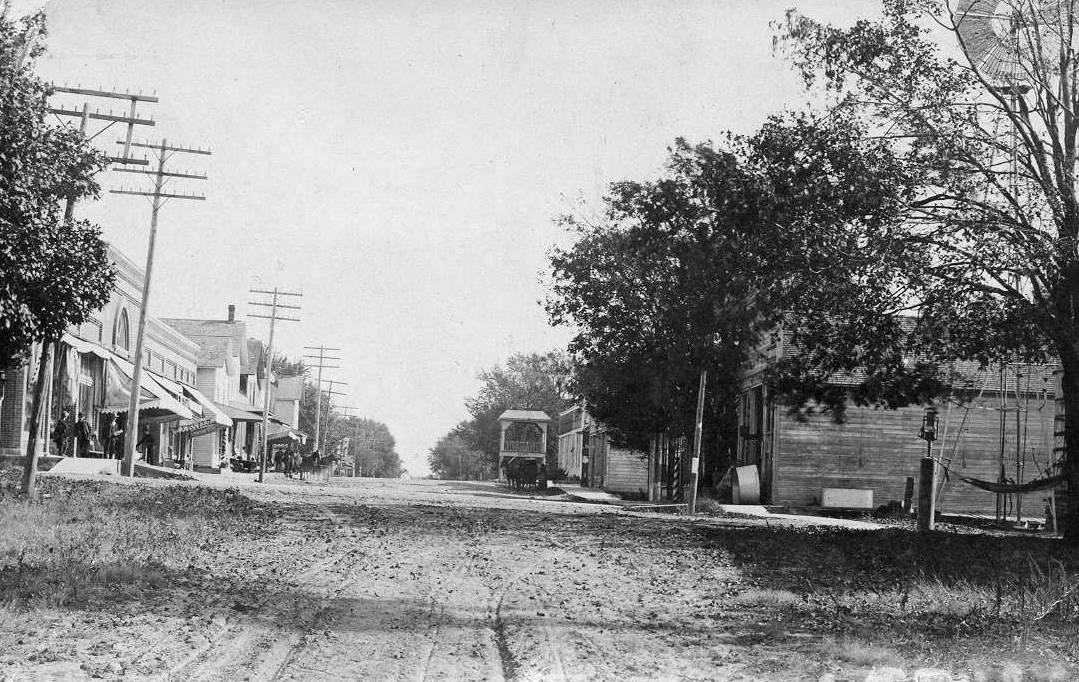
Urbana, Iowa about the time that Ed and family lived there.
James and Lucy Ketterman with sons and daughters
Ed also raised hogs, and he could remember his dad cutting corn and drying it. His mom raised chickens and had a garden. He remembers her making sour krout.
His dad had a machine shed on the farm and had rows of brine barrels filled with pickles. They were horizontal with a bung hole to drain off brine. He would then sell pickles by the bushel to restaurants, and dealers. He also had a warehouse in town and wanted to go into the canning business.
The Courier newspaper of Waterloo, Iowa in June 13, 1915 tells of a new canning plant which had been organized at Urbana. " It will be known as the Ketterman Canning Company. For some years Ed Ketterman has been canning tomatoes on a small scale and has succeeded in his enterprise. A stock company has been formed and a suitable building will be erected and canning will be commenced this year."
But the first world war started and there was no one to pick pickles. At this time he was drafted and before he went he sold the farm and moved the family to town as he had no idea when he would be back or even if he would be back. He said goodbye to his Luella and his sons, left Urbana and went to St Louis but as he was filling out paperwork for the army the armistice was signed and he was able to go back home..Just think of the emotions he must have felt. He sold the family farm and had ended all the sources of income. He would now have to find another occupation to support his family. .................. Picture below is Ed Ketterman with son in bucket.
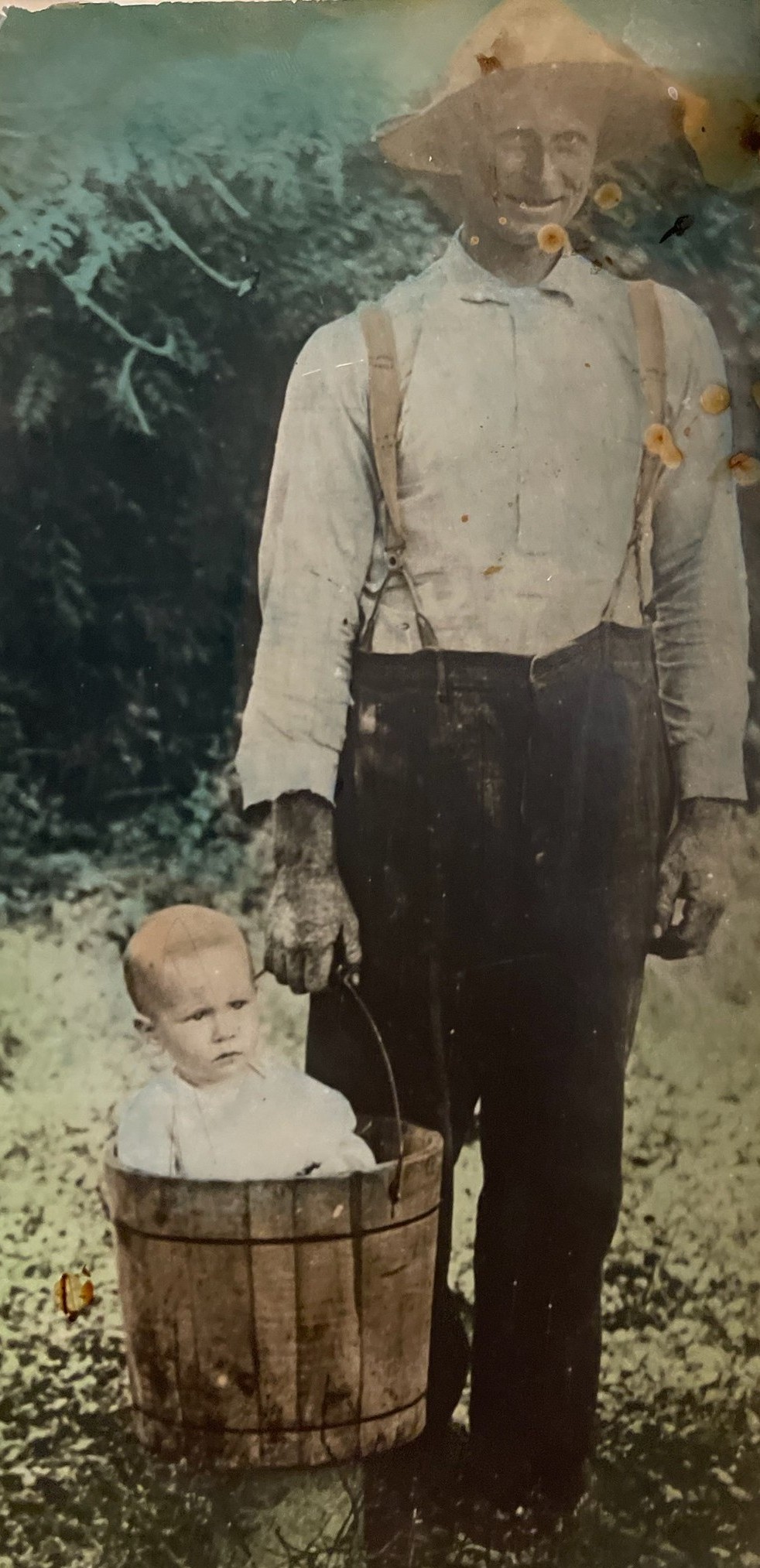
At this time the family moved to Lehigh, Iowa and Paul remembers living in two different houses. He started 1st grade in Lehigh. His father was now going from farm to farm selling dental work contracts for his uncle Harry. For recreation he remembered sledding down hill and skating on the river in the winter. Paul remembers going in a store for candy kisses and asked the clerk for kisses and she leaned over the counter and gave him a kiss. He ran out of the store.....
When he was about nine the family moved to Harvey, Illinois. They stayed with Aunt Mary and Uncle Laff on 153rd and Wood Street in the Christian Church parsonage. By this time Paul was in the 4th grade. He had a paper route and also sold buns for his mother. He Remembered going to vacation bible school. His Uncle Laff Hoff, Mary's husband was the minister at the Christian Church in Harvey. His father Ed was the Sunday school superintendent. His father worked in Chicago as a carpenter on the YMCA building on scaffolding so tall it would sway 3 feet. He also had a job working on engines grinding crankshafts which was very dirty work.
When he was in 6th or 7th grade about 12 years old they again moved this time to a farm near Palatine, Illinois. They lived on a 240 acre farm and he attended a country school. He remembers making hay, threshing, riding horses ,and his mother falling off a hay wagon, and his brother Jim putting a Ford together. They farmed with horses and one Fordson tractor.
One day Jim and Joe went to school about a quarter mile from where the home was on a corner of their farm. They forgot their lunches and his mother sent Paul to school with their lunches. When he got to school they were playing and they ran and slid on wood floors. Paul got a sliver that was about an inch long almost through his foot. His brothers took him home in the wagon and then his mother called a neighbor that was going by to help her and she held Paul while he pulled out the sliver.
One winter Paul brought in a hammer to crack nuts. Because it was cold he put his tongue on it. His tongue froze to it. They had to get a warm towel and then wrapped around the hammer and held it until it released his tongue.
This farm was owned by a Mr. McIntosh and they milked thirty cows. The first year by hand then after that they had surge milking machines with gasoline motors. Paul milked ten cows, Joe milked 10 cows and their father milked ten cows. This was before and after school. They could milk all thirty cows in forty five minutes. One day when he was in eighth grade his dad and Joe were on the threshing crew and he was home alone with his mother. When it came time to milk he milked his ten cows and when he finished his mother told him she would come out and be with him if he would start milking the other cows. He was just finishing milking all thirty cows when his father and Joe came home. Jim was feeding cows, calves, hogs etc. while Paul was milking the cows. They finished at ten o'clock that night.
When they first moved to Palatine, Paul's father went back to Iowa to buy purebred milking shorthorns. He bought about 20 head and had them shipped by train to Palatine. They were unloaded in town near the depot. They pulled the railroad car off the siding and unloaded them down the street. Joe and Paul were on horses and Jim was in a car. His father was walking the lead cow on foot. Something spooked the rest of the cows and they headed back to the train yard pen. They eventually got them rounded up and put in pen by the railroad and then hired a cattle dealer to haul them to the farm.
One Sunday Joe and Paul went riding the work horses but they were not suppose to as that was the horses day of rest. Pauls horse went through a barb wire fence and got cut up pretty bad. The Vet told the boys to wait till their dad got home. He got chewed out but no punishment.
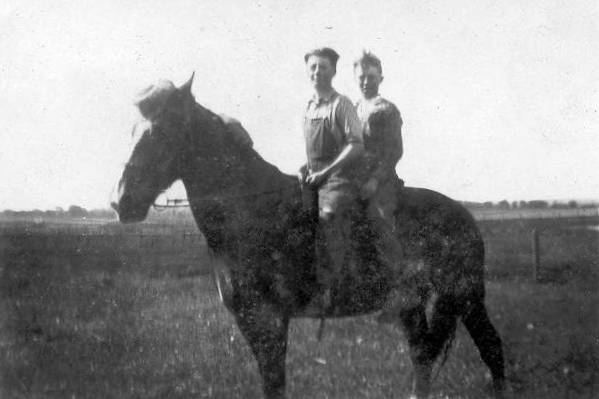
They were loading hay on a wagon drawn by horses with Paul driving and Jim and their mother on top stacking hay. Joe was helping by pitching the hay up to Jim and their mother. The wagon was three foot off ground and hay another eight feet from ground. His mom fell off the wagon from the top. She was taken to the house. That was the end of hay hauling that day.
And then there was the cold day in winter that Paul and Joe walked to school. On the way home from school Paul's foot froze. His dad rubbed snow on it to get the frost out. After that he used the neighbors horse and buggy to get to school. In eighth grade school was three miles by road but if walked was only one mile over plowed field. Paul would go to the neighbors and hitch up the horse and buggy and pick up the neighbors children then take them to school and unhitch the horse before school. After school hitched up horse and buggy and took them home.
The family would always go to church on Sundays. In the winter time when snow was on the ground Paul would hook up the horses to a grain box wagon. One foot of straw in the bottom and a horse blanket made out of the hide of horses was placed in the wagon. Stones were heated and wrapped in towels which were then placed next to the kids to keep warm. It was one mile to Church which was in town. They never missed a church service.
Paul started his freshman year in Palatine High School. His father bought a business that placed vending machines in factories. The products were sandwiches and candy. His family made the sandwiches and put them in a box for the vending machine. Every morning he had to service the vending machines. From Palatine they moved to Joliet for one month then to Kankakee and then to Benton Harbor, and then on to St Joseph, Michigan.
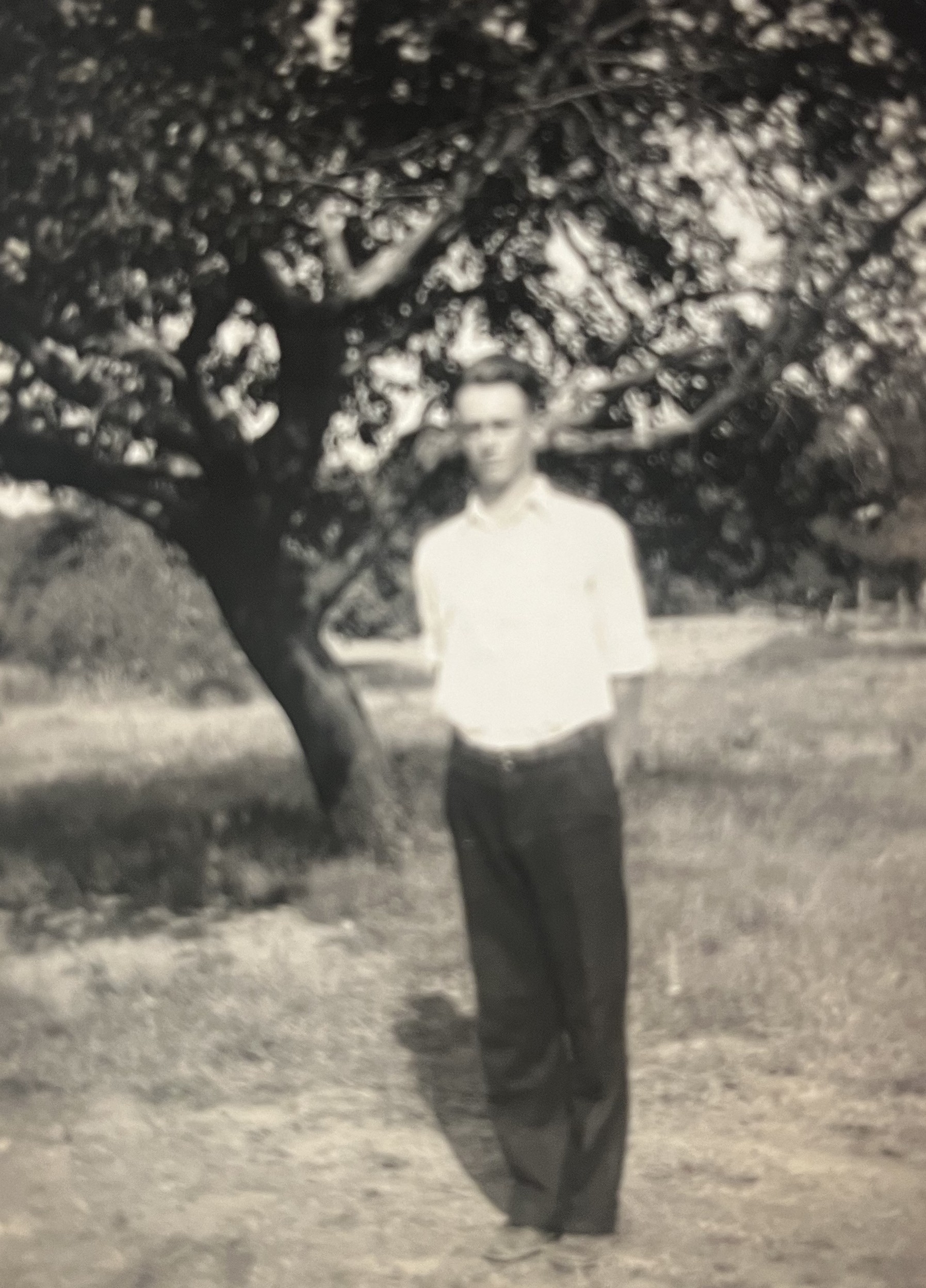
While he was in Joliet on summer vacation he was sitting in the unemployment office and a farmer came up and asked him if he could drive horses. Paul said "no problem" and went to the desk and asked if he could work for him driving horses for a threshing machine. He received three dollars a day, room and board. He took care of the team by brushing and feeding the horses in the morning then leave for breakfast. The farmer was Norwegian and they had really good breakfasts. Paul was small and needed help harnessing the team but then took the team to the wagon and from there to where they to the threshing machine out in the field. His job was to haul bundles from the field to the threshing machine where they would pitch the bundles into the threshing machine. They made certain that they pitched the head end in first. Two teams were unloading at each side of the machine. Half a dozen teams were working at the same time. Farmers worked together as a team each doing a certain job. ................. This image is of a Nebraska farmer harvesting wheat with horses.

One day they loaded Paul up with bundles as high as they could. The farmer said he would give Paul the horses if he would get them stuck in the creek. The other fellows helping to load the bundles heard this and put on an extra big load. The horses had to almost crawl on their bellies to get across the creek. But he made it and then one hundred yards from the threshing machine lost his load. They all helped him reload laughing all the time. One day during this time he was cutting weeds in fence line till he got to a tree stump and hit it with his scythe and yellow jackets stung him and of course he ran to get away from them. The farmers wife counted sixteen stings and that was the last of the weed cutting.
In high school he played football and basketball. He had a model T Ford that he had to crank to start. Before the model T the cars had carbide lights. There was a tank on the side of the fender that he put the carbide in and then water to form a gas the gas hooked up to the lights for car lights. The horn was a rubber bulb. In Lehigh they had a Chevy car. It was a four door touring car with curtains in the winter.
When they moved to Michigan they still had the vending business. His father found a job in a canning plant and Paul took over the vending machine business. He would get up at four in the morning and his dad would pick him up at four thirty. Load pie, sandwiches, and candy from Chicago Edmundsen Bock Inc. Co. at the train. Then service the machines at the factory and then he would go to school. He had his own car in his sophomore year of high school. After school his father checked the vending machines. His mother worked in a canning plant peeling peaches, pears, etc. on the line which was seasonal. His dad next got a job on a truck farm. Apples and berries were the crops. This is where Paul's father first got sick. He became so sick that Ed's sister Effie came to take care of him. He was in the hospital in Michigan for awhile but the doctors said they could not help him anymore. He then went to the Iowa State Hospital in Cedar Rapids, Iowa. His mother went with his father and rented an apartment in Cedar Rapids.
This left Joe and Paul in Michigan. They sold all their belongings and loaded up what they could in their car and the boys drove back to Iowa. They were with their father when he died. This was in 1930 so Paul would have been 16 and Joe 18 years old. Jim started working at Western Electric in Chicago right after High School and was there when their father died. Joe and Paul as soon as they got back to Cedar Rapids got a job in a canning plant till school started. His mother then decided to move back to Palatine, Illinois to be closer to some of her friends. They moved into a house with a barn in back. Paul got a job feeding and exercising a race horse with a sulky. He took it to a race track behind barn and exercised the horse for a year then the owner sold the horse.
Joe and Paul at this time decided to raise rabbits. The had at least twenty-five by Easter time. Paul mentioned that he had three Model Ts. He said that he needed that many just to keep one running as they were drove hard.
This is a picture of Joe Ketterman's produce truck.
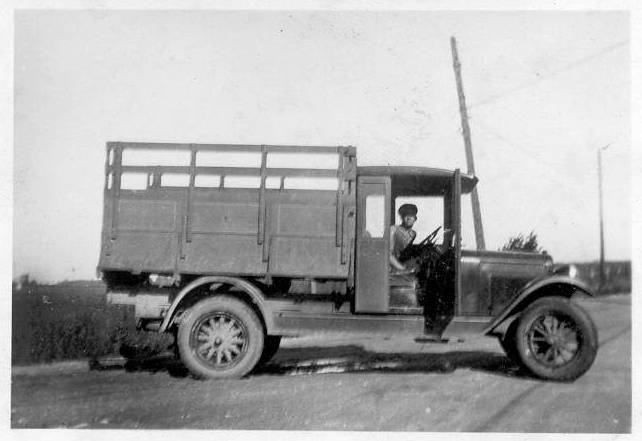
When he had just one more week of high school left Paul decided to quit school and a friend of his named Herb with just five dollars between them decided to ride the freights from Palatine to Waco, Texas. They started out in an empty mail car shut the door and locked it. They rode it to Springfield, Illinois then got out as the railroad dicks (railroad police) were nearby. They then rode under the cars for awhile on rods but they didn't have to go far as the train stopped and they then got into a freight car which took them to Herrington, Kansas. When the train slowed up for Herington they were warned to jump out and ran into the center of town. In town the police asked them where they were going and they told him they were looking for a place to stay. He told them where there was a place to stay but they didn't have enough money so went to a hobo camp instead. From the Hobo camp they waited for another freight train to pull out then got into a open box car for a couple of hours then they could see railroad cars behind them derail and rolling over.
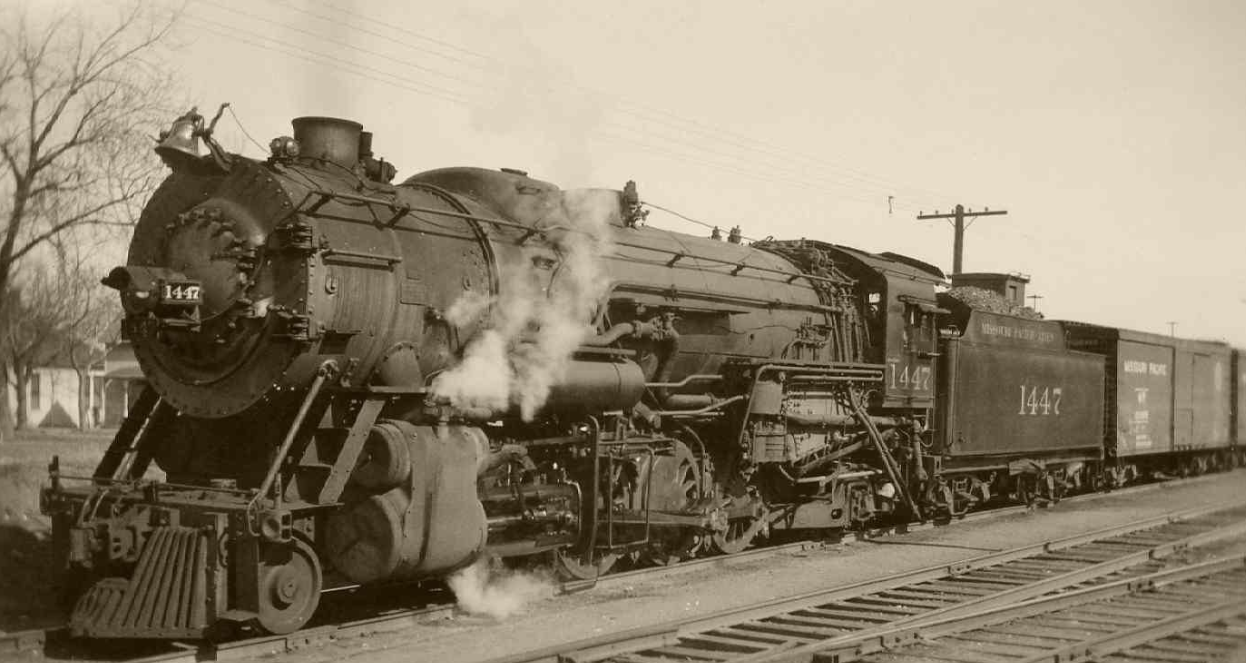
Train leaving Herington, Kansas 1930
From its beginnings, Herington has been a hub for the Rock Island, the Cotton Belt Route, Southern Pacific, and currently Union Pacific Railroad. UP still uses this as its hub on its system to this day. Herington has also been served by the Rio Grande, Missouri Pacific, and the Oklahoma, Kansas and Texas Railroad.
Somehow they managed to get to Waco and stayed with his Aunt Bertha and Uncle Harry but then decided to come back home. They rode the freight trains home the same way they got to Texas.
After getting home he was on the WPA for while. Fifty cents for 6 hours of work a day. He would cut down the side of a hill between Barrington and Palatine with a pick and shovel. He did it for his mother to have money to live on. She had a big house with four upstairs bedrooms. She would take in juvenile boys to board them. He said they were good kids.
Paul at this time decided to join the Marines as he did not want to be a burden to his mother. He took his marine physical in Chicago and only two out of fifty were able to pass. He didn't weigh enough on first physical but left and ate enough bananas to be able to pass the next day. His enlistment date was July 30th 1934. He was sent to Paris Island, South Carolina for basic training. From Paris Island he was put on the United States Ship Chaumont and went down to Panama and through Panama canal to the Pacific ocean. Image below is the USS Arizona
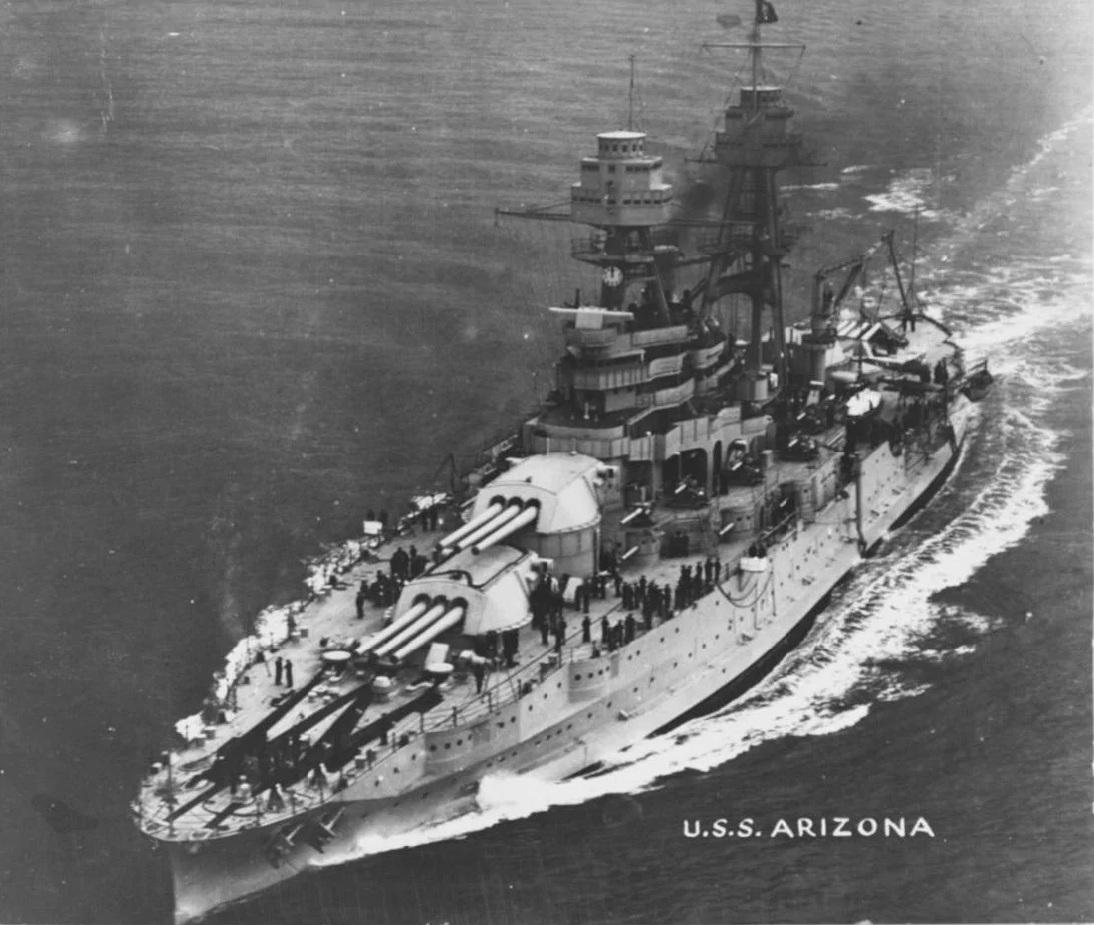
In 1940 he was living with his mother in Arlington Heights, Illinois. His Employer was Pet Milk Company. September 5, 1945 Paul and Mae Etters were married in Harvey, Illinois in the same church he attended when he was younger. Paul and Mae moved to Grand Marsh, Wisconsin where Paul had bought a farm.

The farm soil was sandy and not very fertile for growing crops so they planted pine trees on it and sold it. Paul, Mae and Douglas then made the move to Elgin, Illinois where Paul was working for the Pure Milk Association. Terry their second son was born here. It wasn't long and Paul was transferred to Rochester, Indiana. Mary Beth was added to the family in February 1950. They lived in a house on the north shore of Lake Manitou in a house with the name "The White House" It had large white columns on the south side of the house facing the lake. The children had a lot of fun fishing, swimming, and collecting turtles. Paul was busy remodeling the house. New siding, then changing a front porch to a larger living room with a picture window looking out over the lake. He seemed to be always working on one thing or another.
They attended the Church of God in Akron Indiana every Sunday. Mae would become a Sunday school teacher. Paul was active and helped with the annual fish fry.
In 1957 Paul, Jim, and Ed went in together and bought a lumber yard in Oak Forest, Illinois and Paul's family moved from Rochester, Indiana to a farm outside of Palos Heights, Illinois. The farm had a farm house, large barn, sheds, garage, chicken coup. Soon chickens, sheep, ducks, rabbits, and one Christmas uncles Jim and Ed presented the children with a horse. It also had an orchard with apples, plums, apricots, cherries, pears and around the orchard were gooseberries, and currents. In the woods next to the house were blackberries. Mae was busy all summer canning and making use of all the produce. Mae also had a large garden which the boys helped with planting, weeding and harvesting..In 1959 Gregory was born and the family then moved to Tinley Park, Illinois on a 4.5 acres next to the Cook County Forest Preserve. The house in Palos Heights that they were living in had the top floor removed then raised off the foundation and moved to the new location in Tinley Park. Taking the top of the house off allowed it to be moved without bothering the utilities and saving the cost of moving. Paul was still working with his brother Ed in the lumber business and Jim was a silent partner. The name of the Lumber yard was Forest Lumber Company Paul then joined the Fire Department in Oak Forest.
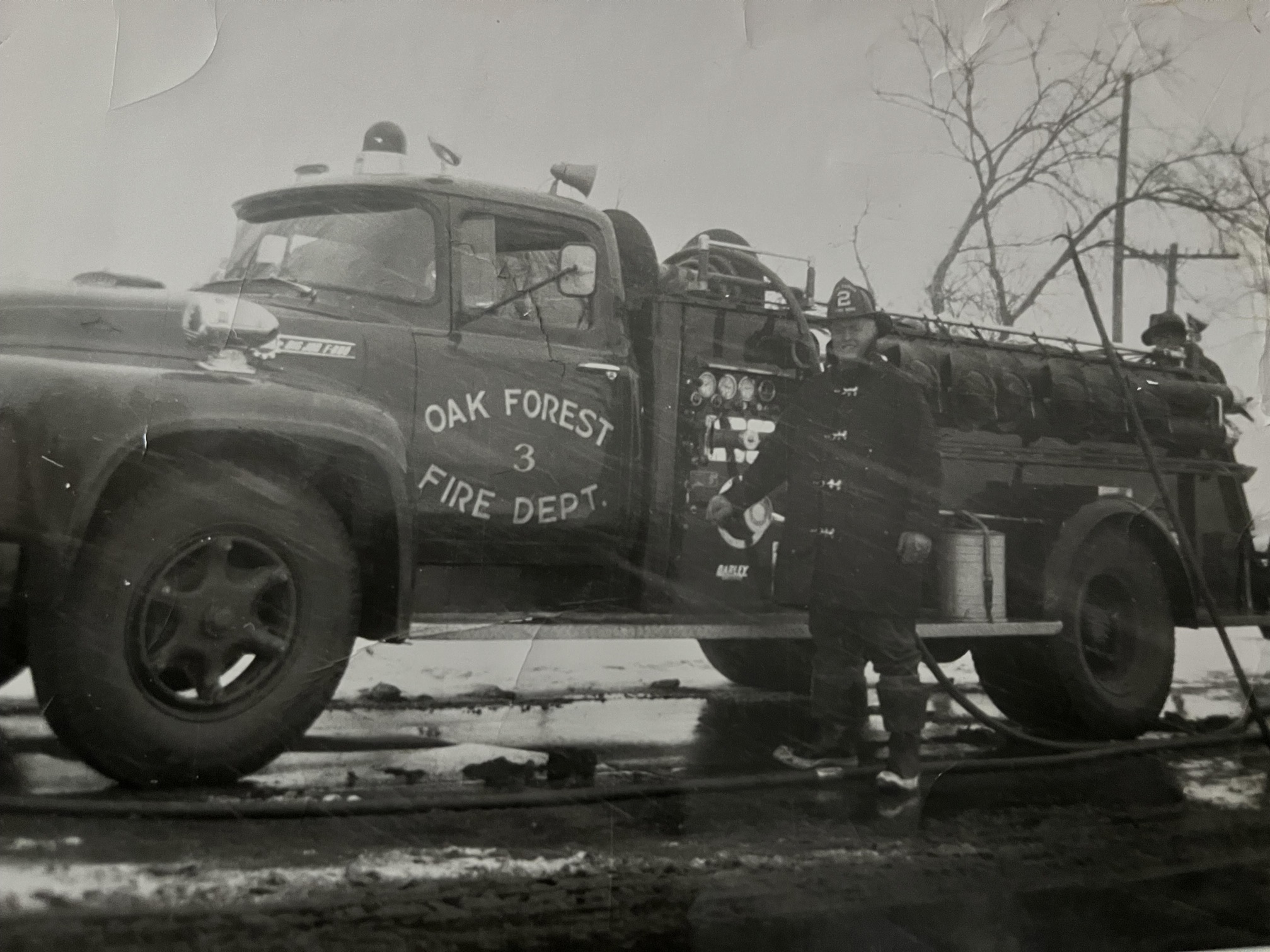
On one fire call on the way back to the fire house a truck driver ran a red light and crashed into the fire truck Paul was driving. There were 2 standing on the back of the fire truck and both were hurt badly. Paul was not hurt.
While he was fortunate not to have been hurt on the firetruck he was not so fortunate when he decided to reroof the grainery next to the barn. At one time it was a house but later turned into a building to store grain. Paul built a scaffold out of 2x4s and other lumber and nailed it to the side of the building. Terry had just left in the truck to go get something and Doug had just climbed off the scaffold to the roof when a board cracked that Paul was standing on and he fell about 15 feet to the ground. The ambulance was called and when he was loaded he told them how he wanted to be picked up as he had experience with injured people from being a fireman. He had a broken femur, cracked ribs, broken arms and it took him over a year to recuperate from the fall.
Paul and Mae had some friends from their church who were from Missouri. They invited Paul to go down with them hunting in the Ozarks. Paul really liked it down there and he found that there was forty acres for sale next to their friends farm so Paul and Mae bought it tore down an old house that was on it and rebuilt a hunting cabin with the help of Doug and Terry. A local bricklayer built a fireplace and chimney. Besides the house there was an outhouse and a log barn.
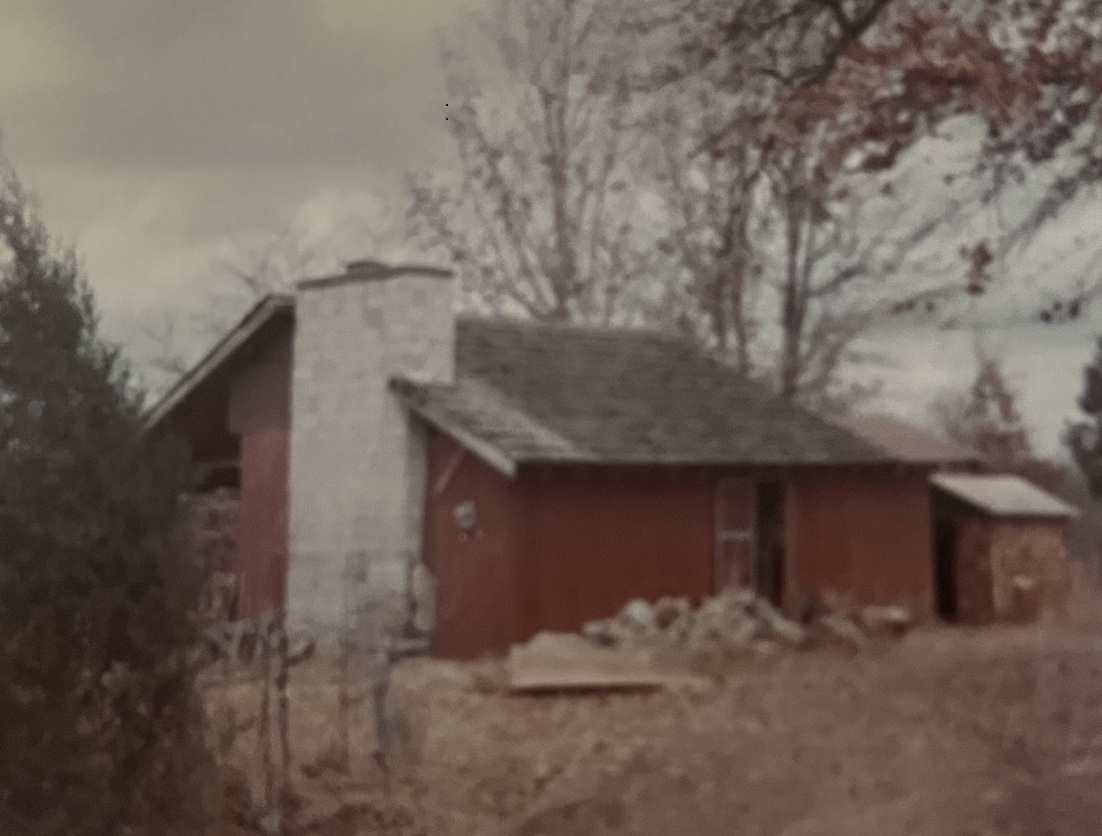
Paul and his brothers decided to sell the lumber yard after several years in business and he would work for two other local lumber yards and then was hired on at Homewood Flossmoor Park District before retiring.
Paul and Mae in retirement were active in their church and spent time at Whitewater Lake in Wisconsin where they had a trailer next to the lake and enjoying fishing together. They also had a trailer on Kentucky Lake and fished here also. One summer Paul and Doug went fishing on Kentucky lake when the wind started picking up making the lake waves quite rough for fishing but the white bass were biting better than Paul said he had ever experienced and he wanted to keep fishing. Paul tied the boat up to the bottom of a concrete bridge support over the lake and the waves would pound the boat causing the rope to jerk. It started to fray and they could tell that it would eventually break which it did. Paul had said when it broke they would stop fishing and go back to the trailer but when they went past the marina on the way back he told Doug to turn in. He went in the store an purchased another rope and they turned around and went back to where they were fishing before. To tie the boat up Doug had to carefully rev the motor up to the concrete while Paul stood balancing himself on the bow of the boat and tied it. While he was trying to tie the boat to he bridge support Doug had to keep the bast from moving in the rough lake water. Paul tying it in the rough water was quite a feat but they were able to and continue fishing.
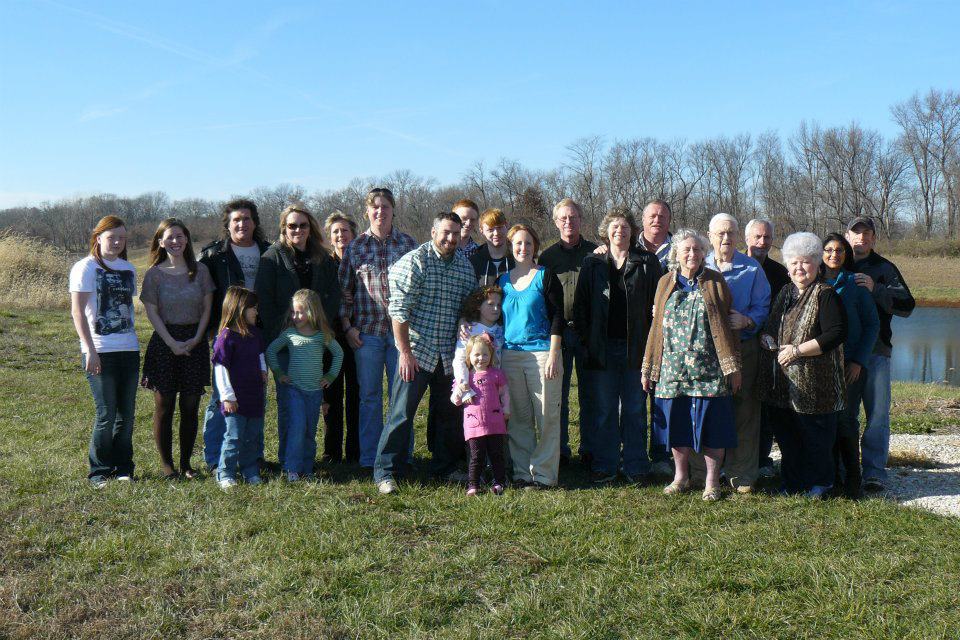
In 2008 Paul and Mae both in their 90's moved to Griggsville, Illinois. Their son Greg had a farm and they lived in their own home on the edge of a large pond there. By this time both were in their 90's so required some help which Greg and Sherri were happy to do.
